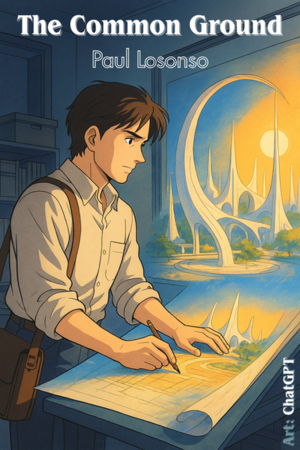Chapter 31:
The Healer and the Compactor
The Common Ground
The next day unfolded much the same. They split into groups, as before.
Down at the market, Bard slapped his hand onto a stack of sharpened timber stakes. “Solid cut. We’ll need at least thirty of these to restore the broken parts of the camp perimeter.”
They moved on to hammers, nails, hut frames. Elias peppered him with questions: how many nails would hold a roof beam, how many huts six men could raise in two days, how much rope scaffolding would need. Stall-keepers smiled at Bard’s booming laugh, and Elias’s sharp, earnest calculations.
“You sound like a true builder,” one blacksmith remarked, handing him a lantern.
Elias flushed. “Something like that.”
Each item was stamped – an ink seal burned into the crate’s edge – so it could be gathered later.
Elsewhere, Cecile was locked in a battle of wills among spice vendors. Fragrant powders swirled in the air as she forced three sellers into a bidding war until the price of a bundle of salt dropped by half.
Trailing behind, Fawks frowned. “Why not just buy bread and be done with it?” The continuous shopping had tired him out a bit. He had seen quite a few parts of the city, but he wanted to see more of it.
Cecile tilted her head, voice brisk and sharp.
“Because grain stores longer. Fish fills bellies faster. Spices keep men from going mad on porridge every day… An army isn’t only fed – it’s kept willing!”
Fawks blinked, processing that. Then, more quietly:
“So this is how you’ve survived so long in the field.”
Her smile was small, almost wistful. Together they stamped sacks of grain, bundles of salted meat, barrels of water, one barrel of ale. By nightfall, their parchment of stamped marks was longer than Fawks’s arm.
“Isn’t there fresh water anywhere near the camp?” Fawks wondered.
"There is," Cecile replied, "but we still need the barrels, and the cost of the empty ones is almost the same."
When all was done, they dragged themselves back to the Morven Ox Inn for another night.
“Ahhh… I’d forgotten how exhausting this is,” Cecile sighed, massaging her aching feet after dinner.
Everyone was equally drained. It wasn’t just the walking, but the bargaining –endless words and numbers– that had sapped their minds.
For a few moments, no one spoke. Then Elias lifted his cup, sipped the thick, mellow wine –grown only on Teranbrath’s cliffside vineyards, sought after across the Common Ground– and asked: “I can’t help but wonder… why did you decide to live so far from the nearest settlement?”
“Easy answer – because there, we’re free!” Cecile replied, still rubbing her sore feet after so many days of walking.
“Free from what?” Fawks mumbled, eyes half-shut, already on the edge of dozing off.
“From the taxes!” Cecile answered without hesitation.
“Oh, you pay taxes in the cities?” Elias asked, surprised.
“The tax applies across the entire Common Ground, not just the cities,” Bard explained. “Only the outskirts are excluded.”
“Well,” Elias pressed on, a note of worry in his voice, “is it much? How many draeli?”
“It isn’t draeli we pay the taxes with here,” Cecile said gravely, “but something far more precious.”
Elias froze – he understood. In stark contrast, Fawks was nearly asleep, his head dipping to the table. “Imagination,” Elias muttered.
“Aye, you got it,” Bard nodded approvingly.
“But… how?” Elias asked, dread creeping into his tone.
Around them, the tavern’s hum carried on: murmurs, bursts of laughter, mugs clashing together… and the slow wail of a fiddle weaving through the air like an old story.
“A small portion of imagination is automatically drained from anyone who resides within the core of the Common Ground,” Cecile explained. “Didn’t you feel a little weaker the moment we passed inside?”
The truth was, Elias had felt terrible the way they entered – leaping across a chasm, himself blindfolded. That alone had drained him so badly that he hadn’t noticed anything else at the time.
Cecile saw the unease on his face. “It’s a passive effect, like the thinning of air at high altitude. No one sees it, but everyone feels it. Some describe it as a loss of inspiration… others, like losing grasp of their dreams… and some, as if a creeping melancholy or despair settles in– ”
“I think he got it,” Bard cut her off gently. It hadn’t been long ago that Elias had felt exactly those symptoms, right up until they reached Lone Haven and he saw the change in Fenric.
Elias remembered – but it didn’t bother him now. He glanced at Fawks, who had slipped awkwardly into sleep against the table.
“I’d better get him upstairs,” Elias said, nodding toward the boy.
“I think we should all head to bed,” Bard agreed, rising slowly.
“Are those taxes the same for everyone?” Elias asked, just before scooping Fawks into his arms.
Cecile shot Bard a triumphant smile, as if to say you shouldn’t have hushed me earlier, and carried on with the explanation. “The tax is proportional. But, for those with greater imagination, it’s hardly noticeable. For weaker dreamers, the burden feels heavy.”
“Hang on!” Elias stopped mid-step, shifting Fawks in his arms. He touched the boy’s face, frowning. “He’s burning up. He’s sick!”
“Oh no…” Cecile’s tone dropped. She turned quickly to Bard.
“I’ll find a healer, even at this hour,” Bard said, and hurried out the door.
Moments later he was back. “Anyone here a healer?” he called into the tavern.
Silence.
He hurried out again.
Not too long after, a woman at a nearby table slowly raised her head. She reeked of ale, and her words slurred as she declared: “I am… a hea-ler.”
“Oh no,” Cecile whispered again, but this time with a groan. She leaned toward Elias. “Did she see us?” she hissed, meaning to hurry upstairs before they were noticed – but it was already too late.
“She’s coming this way,” Elias said.
The woman stumbled toward them with surprising determination. Laughter trailed her from the surrounding tables. Her eyes, a sharp and startling blue, seemed to gleam – but whether from vitality or drink, Cecile couldn’t tell.
“Who’s sick?” she asked.
“The boy,” Elias answered.
She pressed her hands to Fawks’s forehead and neck. “Hmm… hmm… I see…” she murmured, inspecting him with bleary focus. Cecile covered her face with a handkerchief as if overwhelmed with emotion – but really to block out the stench of alcohol. In her feigned distress, she even stepped back a pace or two.
“Do you have a room here?” the healer asked.
“Yes,” Elias replied. “Shall I carry him up?”
The woman nodded.
As Elias climbed the stairs with Fawks clinging to him, the boy muttered in his sleep “daddy… daddy…” and other broken, incomprehensible words. Elias laid him gently on the bunk bed.
“Poor boy,” Elias murmured. “I think his fever is climbing even higher.”
“Let me see,” the woman said. After a pause, she added, “Ah, yes… hmm.” Then she turned to Elias. “Do you have a dral? His fever’s bad, and I’m already spent for the day.”
Cecile shot her a skeptical look.
Elias pulled an azure petite from his pocket and held it out. “Will this do?”
The woman nodded, slipped it into her mouth, and chomped down on it. At once, her bearing shifted. She bent over Fawks, cupping his ears in her hands, eyes closing. For a while she remained like that, but her body soon trembled; sweat poured from her, her hands quivered against the boy, her legs barely kept her upright.
“Elias,” Cecile hissed under her breath, urgent, “pull her away! Can’t you see? She’s just drunk!”
Elias froze. Part of him feared Cecile was right – that this was nothing but drunken nonsense. But another part whispered: what if she truly is helping, beyond her strength, burning out on imagination itself; soon to perish?
He didn’t know what to do.
At last, the woman gave a long sigh, dropped her hands, and declared, “He’s fine now. Just let him rest. Don’t wake him at dawn. By morning, he’ll be well.”
“Oh, thank you,” Elias said. “How can we repay you?”
“I don’t charge for little ones,” she nodded toward Fawks. “Besides, you already gave me an azure dral, remember?” Her smile was warm now, almost like she was a different person.
Cecile, after checking Fawks’s forehead herself, also thanked her.
Not long after she was gone, Bard returned, and shaking his head he announced that there was no healer to be found and that they should better take him to the infirmary. But Fawks was well.
The next morning, a little later than planned, they returned to the market square. The stalls buzzed like a hive, voices rising and falling in swells. A man awaited them there – a copper monocle over one eye, ink-stained fingers, his palms covered with tiny burn scars: The Compactor.
He spread their stamped parchment wide, whistling low.
“You want all this shrunk into one sack? Used to be I’d charge three Amber larges. Times change. Now it’s five.”
Cecile hissed through her teeth. Bard grumbled. “We don’t have five.”
The Compactor only shrugged.
Silence stretched – until Elias dug into his pocket. A faint blue glow leaked between his fingers.
“Would you take azure?”
The man’s monocle gleamed. “Azure mark, eh? That’ll do.”
Fawks grinned, pulling two more azure stones from his own pouch which Elias had bought him this morning. “Looks like we both saved a little.”
Together, they followed the Compactor through the market. He laid his palms on crates and barrels; each time, he whispered, and the goods shimmered, shrinking into beads, slivers, tokens. A sack of grain became no bigger than a pebble; a hut-frame folded down to a splinter of wood.
Children followed in wonder, merchants whispered in awe. By the end, all their provisions fit into a single leather sack no larger than Bard’s chest.
Elias tightened the drawstring and hefted it onto his shoulder. “Three days’ chaos, in one bag,” he muttered, half in awe, half in doubt.
Cecile arched an eyebrow. “Let’s just hope Jeana can make them large again.”
“She will,” Bard said firmly. Then, smiling at Elias: “But first – we pay a visit to the Warden.”
“To Orrendale?” Cecile asked, glancing between Elias and Fawks.
“To Orrendale!” both answered together.




Please sign in to leave a comment.